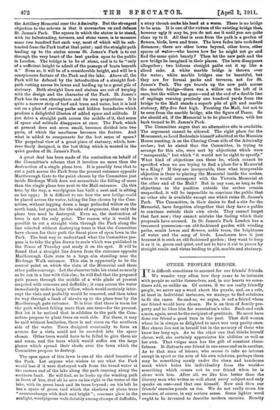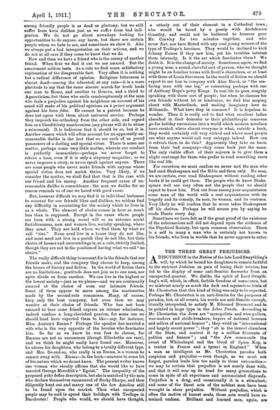OTHER PEOPLE'S HEROES.
IT is difficult sometimes to account for our friends' friends. We wonder very often bow they came to be intimate with people so unlike themselves, and, in our hearts we some- times add, so unlike us. Of course, if we are really friendly people, we never say a word about the puzzle, and, as a rule, at least in individual instances, we manage to find solutions to fit the cases. So-and-so, we argue, is not a friend whom our friend would have chosen. He is an item of family pro- perty and he likes him for association's sake. Such-and-such a man, again, must be the recipient of gratitude. He must have done our friend a good turn in the past. That dull woman whom he is always so delighted to meet was very pretty once. Her charm lies not in herself but in the memory of those who knew her long ago. As to the other one that thinks herself clever, well, she certainly appreciates his abilities as well as her own. That vulgar man has the gift of constant cheer- fulness. It distracts our friend in one sense and us in another. As to that man of leisure, who seems to take no interest except in sport or the acts of his own relations, perhaps there may be something manly under the clean and handsome mask which hides his individuality from the world—. something which comes out to our friend when he is alone with him. After all, we like him better than the literary man who writes so well about every subject and only speaks on one—and that one himself. Now and then our friends' enemies puzzle us too. We do not really mean his enemies, of course, in any serious sense. Some lighter word ought to be invented to describe modern enemies. Enmity
among friendly people is as dead as gluttony, but we still suffer from keen dislikes just as we suffer from bad indi- gestion. We do not go about nowadays looking for opportunities to do anyone any harm, but there are certain people whom we hate to see, and sometimes we show it. Also we always put a bad interpretation on their actions, and we do not at all care if they come to know that we do.
Now and then we have a friend who is the enemy of another friend. When first we find it out we are amazed. But the amazement seldom lasts. As a rule we find some satisfactory explanation of the disagreeable fact. Very often it is nothing but a radical difference of opinion. Religious bitterness is almost dead—among the educated, at any rate—it is a mere platitude to say that the same sincere search for truth leads one man to Rome, and another to Geneva, and a third to Agnosticism, but those who smile comtemptuously at the man who feels a prejudice against his neighbour on account of his creed will make of his political opinions an a priori argument against his bona fides. He cannot be a patriot because he does not agree with them about universal service. Perhaps they impeach his orthodoxy from the other side, and regard him as a bloodthirsty anachronism (any phrase will do to abuse a miscreant). It is ludicrous that it should be so, but it is. Another reason which will often account for an apparently un- reasonable dislike is the fact that we are each of us proud possessors of a darling and special virtue. There is some one matter, perhaps some very little matter, wherein our conduct is perfectly immaculate—perhaps we never forget to return a loan, even if it is only a sixpenny magazine; or we never improve a story, or never speak against anyone. There are some people who never make friends with anyone whose special virtue does not match theirs. Very likely, if we consider the matter, we shall find that that is the case with our friend and his enemy. Another frequent cause of un- reasonable dislike is resemblance : the man we dislike for no reason reminds us of one we hated with good cause.
But, however difficult we may find it in individual instances to account for our friends' likes and dislikes, we seldom find any difficulty in accounting for the society which he lives in as a whole. The element of choice comes in here so much less than is supposed. Except in the cases where people are born with a strong social will or an extreme social fastidiousness, men and women live, socially speaking, where they must. They are held where we find them by what we call " ties." None need live in a house they do not like, and most need not live in a parish they do not like, but their choice of houses and surroundings is, as a rule, strictly limited, though they are not in the position of having what we call " no choice."
The really difficult thing to account for is the friends that our friends make, and the company they choose to keep, among the heroes of history and fiction. In the world of fiction there are no limitations ; gratitude does not join us to one man, nor spite divide us from another. We can live in the highest or the lowest society—just as we please—and we are continually amazed at the choice of even our intimate friends. Some of them appear to move among the marionettes made by the second-rate romancers. Many, of course, keep only the best company, but even then we may wonder at their choice of friends. Who has not been amazed to hear some friend express an intense admiration, indeed confess a long-cherished passion, for some one we should least have expected them to like—say, for instance, Miss Austen's Emma P Perhaps the speaker has married a wife who is the very opposite of the heroine who fascinates him. So far as we know he was free to choose, for Emmas are not so uncommon (though Elizabeths are rare), and we think he might easily have found one. Moreover, he adores his daughters, who belong to a totally different type, and Mrs. So-and-so, who really is an Emma, is a woman he cannot away with. Emma—in the book—answers to some bit of his nature which we do not know. The present writer knows one woman who stoutly affirms that she would like to have married George Meredith's " Egoist." The inequality of the proposed yoke defies description, but she is matched by the men who declare themselves enamoured of Becky Sharpe, and then diligently hunt out and marry one of the few Amelias still to be found upon the market. Then what unexpected people may be said to spend thcir holidays with Trollops in Barchester ! People who would, we should have thought, e utterly out of their element in a Cathedral town; who would be bqred by a gossip with Archdeacon Grantley, and could not be bothered to humour poor Mr. Crawley for two minutes together, and who never flirt, nor have flirted with any real young women of the type of Trollope's heroines. They would be inclined to kick Johnny Eames if they saw him, yet his troubles interest them intensely. Is it the art which fascinates them P We doubt it. It is the change of society. Sometimes, again, we find a young man, a sound, cheerful sort of person, who we thought might be on familiar terms with Scott's characters, or at least with those of Louis Stevenson. In the world of fiction we should expect to see him in company with Alan Breck, or "the sea- faring man with one leg," or consorting perhaps with one of Anthony Hope's petty Kings. In real life be goes, roughly speaking, with those sort of people ; but when he chooses his own friends without let or hindrance, we find him moping about with Maeterlinck, and making imaginary love to Melisande. What have they in common P It is hopeless to wonder. Then it is really sad to find what excellent ladies absorbed in their domestic or their philanthropic concerns go for holiday excursions into a world which modern novelists have created, where almost everyone is what, outside a book, they would certainly call very wicked and where most people are what anyone would call very unhappy indeed. How can it refresh them to do this ? Apparently they take no harm from their bad company—they come back just the same. The only visible effect of their sojourn is to give them a slight contempt for those who prefer to read something more like real life.
For ourselves, we must confess we never met the man who had read Shakespeare and the Bible and them only. No man, we are certain, ever read Shakespeare without reading other books if he could get them. The people who do know Shake- speare well are very often not the people that we should expect to know him. Pick out from among your acquaintance some man of the world with a real acquaintance with its tragedy and its comedy, its men, its women, and its customs. Very likely he will confess that he never takes Shakespeare off his shelves. Perhaps he will amaze you by saying he reads Dante every day.
Sometimes we have felt as if the great proof of the existence of the subconscious self did not depend upon the evidence of the Psychical Society, but upon common observation. There is a self in many a man who is certainly not known to his friends, who lives in worlds that he never appears to enter.











































 Previous page
Previous page